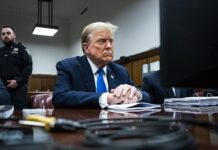 By Danlami Nmodu
By Danlami Nmodu
A British Court has revealed why oil giants Shell and ENI lately avoided doing deal directly with Malabu oil in the attempts to settle the OPL 245 controversy.Lady Justice Gloster said inter alia in the judgment of Royal Courts of Justice Strand, London, WC2A 2LL ,dated 17/07/2013 at that :
“Following the meeting on 15 November 2010, details also began to emerge of a lawsuit that had been filed by Mohammed Sani, the son of General Abacha, on 24 November 2010 against inter alia Malabu, its shareholders as shown on the register and Shell, in an attempt to obtain recognition of his shareholding in Malabu, and that he had commenced injunction proceedings in connection with the sale of the block. In his evidence in the ILC Arbitration, Mr Agaev, who was informed of this development by Shell, said of this development:
“The name of Chief Etete did not shine but the ghost of Sani Abacha’s reputation seemed likely to kill the deal. Moreover the legal risks around OPL 245 effectively doubled…”
Lady Justice Gloster said, “I conclude that it was probable that, as submitted by EVP, the Mohammed Abacha claims prompted Shell and ENI to rethink their willingness to be seen to deal with Malabu, which ultimately led to the transaction being structured in the form of two separate resolution agreements with the FGN. This avoided the need for either ENI or Shell to contract directly with Malabu, something that was emphasised in the later press release by ENI, in which it denied that it had entered into any direct transaction with Malabu.
The court recalled that “On 15 November 2010 a meeting was held at the offices of the Attorney General of Nigeria in Abuja. EVP was not invited to the meeting, and Mr Obi did not receive advance notice that it was going to happen. The meeting was attended by representatives of Shell, ENI/NAE, Malabu and the FGN. The representatives of Malabu who attended the meeting were Mr Munamuna, Mr Gbinigie and an external legal adviser, Dele Adesina. Neither Chief Etete nor Mr Agaev attended. Mr Armanna attended on behalf of ENI (and possibly also Mr Casula) and Mr Peter Robinson attended on behalf of Shell. Mr Obi found out about the meeting and what had been discussed at it, from communications and conversations with Mr Agaev (who had been informed about it by Chief Etete), and also from communications and discussions with Mr Descalzi of ENI.
“ I accept Mr Howard’s submission that on the evidence the likely catalyst for the meeting was Malabu’s precipitous and uncommercial letter rejecting the 30 October 2010 offer. It is likely that ENI and Shell had become exasperated by Chief Etete’s reaction and so sought the assistance of the Attorney General. I also accept that the SPA which had been negotiated between EVP and ENI/NAE was used as the basis for an effort to conclude the transaction, and that Chief Etete agreed on the phone in principle to accept a price of $1.3 billion after NAE had offered to increase the price by $40 million. The latter fact is supported by the fact that the figure of $1.3 billion was discussed at the meetings that followed in late November 2010. This was denied by Chief Etete in cross-examination, although he was unable to explain how it was that the price was increased by $40 million. Mr Gbinigie also denied in cross-examination that the SPA which had been negotiated between EVP and ENI/NAE or ENI’s offer of 30 October 2010 was discussed at the meeting on 15 November. I find this impossible to accept, given the necessary involvement of both Shell and ENI in the offer and a joint presence at the meeting.
“I am able to accept Mr Gbinigie’s evidence in general terms that, at the meeting, the Attorney General said that the FGN’s objectives were to settle the ICSID arbitration proceedings and finally to put the oil-field into operation; that a deal was essential; that he expected Malabu and Shell to compromise to get a deal done, without the disputes dragging on; and that his approach was to reach negotiated solutions to the conflict for the good of all. I am also prepared to accept that various solutions were discussed including: a joint venture between Malabu on the one hand, and SNUD with ENI on the other; Malabu taking OPL245 with a third party investor and refunding SNUD for any costs incurred in relation to the block; and the FGN allocating a different block to SNUD, and Malabu surrendering the block to the Government for cash. It was clear that there was discussion generally about how the settlement talks were to be progressed.
On the ownership of Malabu, the Justice Gloster said “It was common ground that the initial shareholders of Malabu were a Mohammed Sani (10 million shares), a Kweku Amafegha (6 million shares) and a Hassan Hindu (4 million shares). Chief Etete and Mr. Gbinigie insisted, when they gave their evidence, that they did not know whether Mohammed Sani was an alias for Mohammed Abacha, the son of General Sani Abacha; but other evidence demonstrated that Mohammed Sani was indeed Mohammed Abacha, the son of General Sani Abacha. In November 2010 injunction proceedings were brought by Mohammed Abacha in connection with the sale of the block, on the premise that his shareholding had been unlawfully removed from the share register. I was unable to accept Mr. Gbinigie’s evidence that, in the circumstances, he, as company secretary, did not know the identity of the principal shareholder and director of this newly incorporated company, which he had incorporated.
“The evidence shows that Kweku Amafegha was widely reported to be an alias or front for Chief Etete. Chief Etete also accepted that, as he had conceded to the French Criminal Courts, “Omoni Amafegha” was an alias which he used. Chief Etete’s evidence was that he used this name when he went on “secret missions internationally” in order to disguise his identity. However, Chief Etete denied in cross-examination that he also used Kweku Amafegha as an alias. The other evidence relating to payment of the incorporation expenses also strongly suggested that Hassan Hindu was a nominee for, and/or an associate of, Chief Etete. I find as a fact that, from its incorporation and at all material times, Chief Etete had a substantial beneficial interest in Malabu.
“The award of the licence relating to OPL 245 was recorded in two letters from the Ministry of Petroleum Resources. Reference was made in these letters to a letter of application by Malabu. Although no copy of the letter of application has ever been disclosed by Malabu, Chief Etete claimed in cross-examination that he had seen a copy of the letter of application. I was unable to accept this evidence. In the Federal Government of Nigeria’s (“FGN’s”) submissions to the House of Representatives in Nigeria (leading to a report in May 2003) it was stated that:
“Block 245 was allocated as a discretionary allocation under which the applicant would normally write to the minister applying for a block and listing willingness to comply with provisions and conditions that would be imposed, and giving information about the proposed methods for developing the block. There was no application letter or form from Malabu. In other words, contrary to the assertions of Malabu Oil and Gas, at no time did Malabu ever apply for the block, either through a letter, an application form, or any other way. Nonetheless, the minister, Chief Dan Etete, gave instructions for OPL245 to be allocated to Malabu. The Department of Petroleum Resources, in obedience to the minister, carried out these instructions. It was bound to do this. However, the process of allocation was flawed and the allocation lacked transparency and was unethical.”
0PL 245:Abacha’s Ownership Claims Forced Shell,ENI to Avoid Dealing Directly With Malabu
Follow Us On WhatsApp



